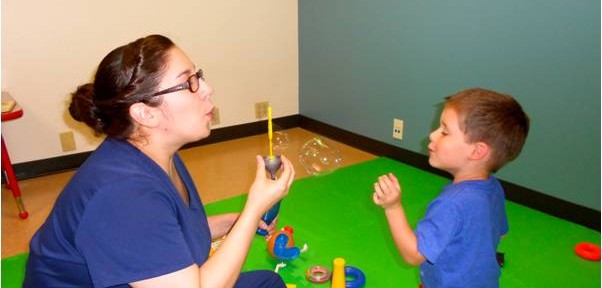As I mentioned in my previous blog, there are thousands of published research studies to support the effectiveness of ABA in treating autism and Aspergers. Specifically, ABA seeks to decrease challenging behaviors and increase appropriate skills that are seen in many individuals with autism or Aspergers.
To help understand what your ABA therapist seeks to accomplish, let’s cover what these terms mean:
Challenging Behaviors
Challenging behaviors refer to those behaviors that put the individual in danger, put others around them in danger, or prohibit/limit a person’s use and access to community facilities (Emerson et al., 1987).
Let’s say a 12-year old with high functioning autism, “Jake,” told his overweight teacher that she is fat. The teacher, who was very insulted by the comment and the conversation that followed, sent him to the principal’s office for bad behavior.
From Jake’s perspective, he didn’t understand why he was in trouble for telling the truth. If Jake engages in these types of behaviors regularly, he may soon be unable to access his general education classroom.
As such, this behavior is considered a challenging one that an ABA therapist can help address.
Appropriate Skills
On the other hand, appropriate skills refer to skills that a person needs to be successful. Those skills take into account the person’s chronological age and their cognitive level of functioning.
Appropriate skills include the following:
- Academic skills, like counting, adding, and reading
- Language skills, including receptive (understanding) and expressive (spoken) language
- Daily living skills, including toileting, getting dressed, and ordering food at a restaurant
ABA can be utilized to target any of the above skills that are socially significant for a person and help them grow these abilities.
For Jake, a socially significant skill would be to identify when a comment can be perceived as an insult by another person, and respond appropriately by remaining silent or saying something else. By honing this skill through ABA, Jake will be able to avoid being dismissed from class.
For families with children on the autism spectrum, it is important to teach some of the behaviors and skills that come naturally to neurotypicals. Those behaviors and skills are exactly what an ABA therapist will help parents teach and support.
In future blogs, we will talk about the steps to increasing appropriate skills and decreasing challenging behavior by utilizing ABA.
What are some of the challenging behaviors or appropriate skills that you see in your child with Aspergers or HFA?
By Dr. Berenice de la Cruz, PhD, BCBA-D, Training and Research Director, ACN
A graduate of Abilene Christian University, Jennifer had a long career in TV Broadcasting. Upon learning her oldest son Sam had a form of Autism called Asperger’s Syndrome, she left her career and became a full-time mother to both of her sons. Jennifer elicited the participation of her family and together they produced several independent programs including a children’s animated series titled Ameriquest Kids, as well as a documentary and book titled, Coping to Excelling: Solutions for School-age Children Diagnosed with High-Functioning Autism or Aspergers Syndrome. She formed the nonprofit Asperger101 to provide on-going free resources related to ASD at Aspergers101.com and has implemented the Texas Driving with Disability Program and continues to grow the statewide initiative today. She and her husband have recently retired to their property in the Texas Hill Country.



Hi
I like your example re “fat”. I work with children and adults with ASD and the most refreshing aspect of our communication is that un-social way of stating the facts. I think that there could be work to be done in both worlds. We tend to avoid the simple truth, that we fill with judgement and social norms. So yes, Jake. I’m overweighted. I’m not even working on this at the moment, it’s not my priority… What I like, working with young children and many students with ASD, is that lack of judgment that we could slowly destroy with proper ABA techniques that could confuse everyone and everything. I think ASD is somewhere not in the middle of our humanity spectrum of honesty and socialisation. And I think it does add something to our intelligence and reflection on where we stand and where we’re going. I have many “fat” friends with whom I have to totally ignore this cultural condition. And I don’t like it when someone comment on my size or fat. But then. Where’s the truth? Will we force our illusions on others? Can we first acknowledge the truth coming out so badly? There’s no right way to talk about obesity (to continue with this example only), it always hurts. And that’s not the only thing we culturally try to ignore. I actually like the way conversations with students with ASD develop. And how understanding could lead to better social behaviour. And don’t take me wrong, I’m a total believer of ABA. It can save lives. But let’s balance that with a little bit of humour, cultural growth, and personal work
It is my opinion that if there is an article on ABA, it should include the negative aspects of this, now controversial model of treatment as well as the positive ones.
I enjoy what you guys are usually uup too. This sort of clever
work and coverage! Keep up the good works guys I’ve included you guys to my blogroll.
Thank you! We really appreciate your feedback. We have some exciting plans in the works for Fall to reach out and interview experts and news-worthy stories through our video program Top of the Spectrum News. Finalizing details. Let us know if you have content to add! :)